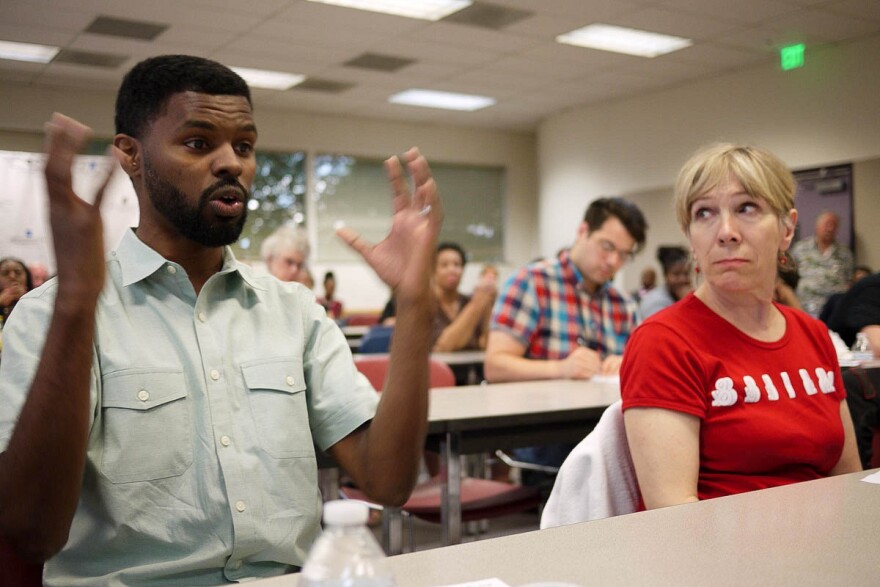Anger, fatigue, frustration, resolve.
Those were some emotions that surfaced at a community gathering Thursday with Seattle police. It was a meeting of SPD’s African American Advisory Council, on the heels of a string of tragedies and tension across the country.
TRANSCRIPT
About 50 people gathered in Seattle’s Central District for this monthly meeting. Veronica Beach is a regular. And she wants these meetings to spark change.
Beach: "Police, blacks, whites – all of us coming together and working together. That’s what I wish at every meeting. I just want to see some unity."
Beach became a block watch captain in this neighborhood in the 1980s. And she’s been involved in police and safety issues ever since. She’s at meetings like this twice a week. But she’s says nothing changes.
Beach: "I feel like we’re still fighting about some of the same issues. And it’s all talk."
[asset-images[{"caption": "Fiola Johnson, the mother of a black Seattle police officer, addressed police in the room directly as Chief Kathleen O'Toole looked on. ", "fid": "128126", "style": "placed_wide", "uri": "public://201607/spd1.jpg", "attribution": "Credit KUOW Photo/Liz Jones"}]]She says this meeting may be her last.
Tonight, there’s no agenda. It’s an open discussion. More white people than usual have come. Seattle Police Chief Kathleen O'Toole is also here, along with several officers.
Fiola Johnson is the mother of a black Seattle police officer. She addressed the police in the room directly.
Johnson: "I love you guys, I really do. I respect everything you do. When one of you is shot and killed it hurts my heart. When one of my black people gets killed it hurts my heart. But I don’t know if we ever get it right. I really don’t."
[asset-images[{"caption": "Frustrated by the lack of progress, Veronica Beach plans to take a break. ", "fid": "128127", "style": "placed_wide", "uri": "public://201607/sped2.jpg", "attribution": "Credit KUOW Photo/Liz Jones"}]]People asked questions about anti-bias and cultural sensitivity training for police. Chief O’Toole said that happens. And she stressed the department needs to recruit officers who want to engage the community and represent its diversity.
Sean Connor, 37, said he wants to see solutions now because too many young black men like him are living in fear.
Connor: "The mentality that I have to have, just to commute from my house to a building in Redmond is stressful, every day. We shouldn’t live like this."
Connor wants to see forums that bring police and young black men together to try to understand each other.
After the meeting, Beach says the call for more dialog sounds like a good idea.
Beach: "It’s going to die down, I guarantee you."
She’s come to a decision.
[asset-images[{"caption": "African American Community Advisory Council for the Seattle Police Department.", "fid": "128128", "style": "placed_wide", "uri": "public://201607/spd5.jpg", "attribution": "Credit KUOW Photo/Liz Jones"}]]Beach: "I want to be hopeful. I want to see change. But I’m going to walk away."
At least for now.
Others appeared more optimistic and swapped contact info with group members, vowing to follow-up on some ideas raised in the discussion. One police officer commented, "It might be the same conversation over and over, but it's getting better."


